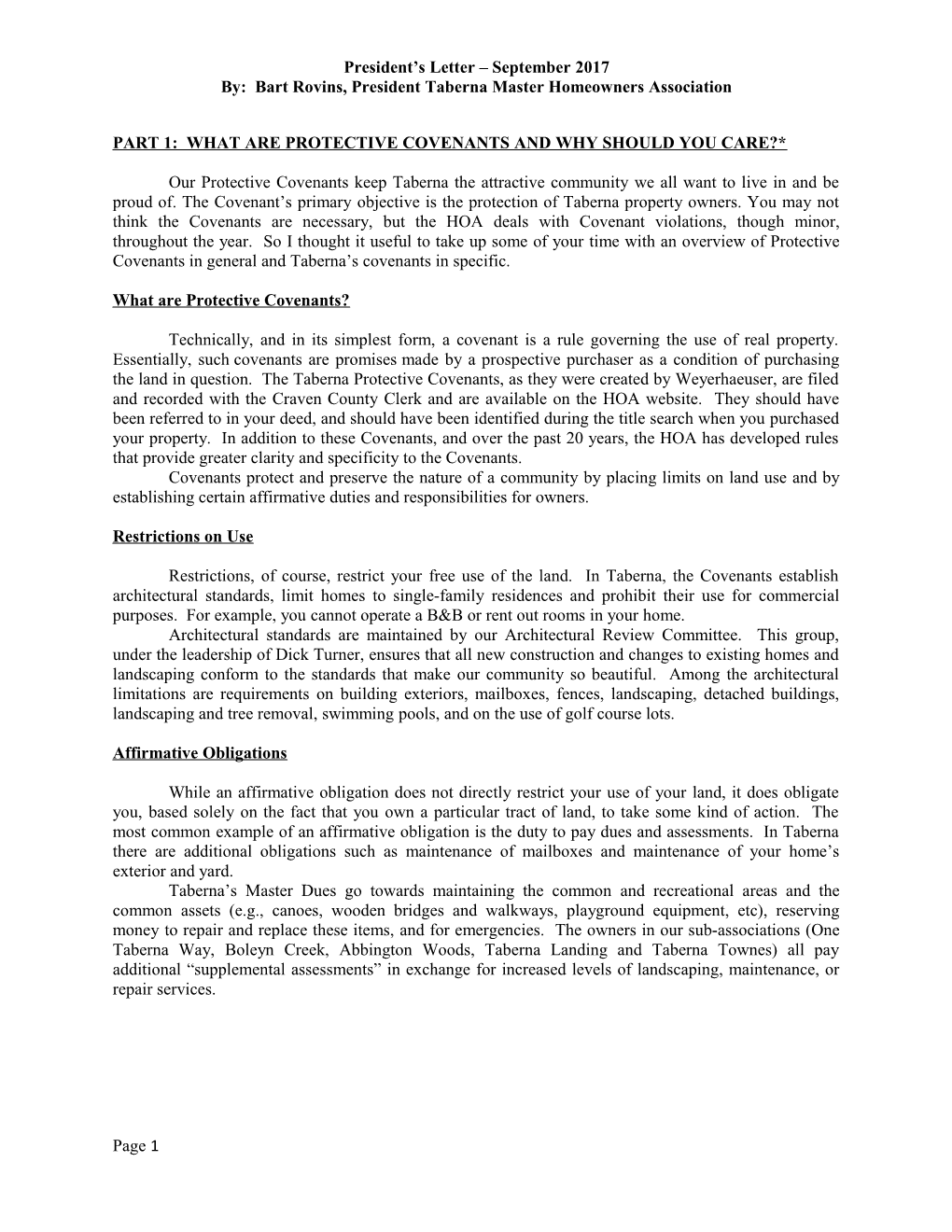President’s Letter – September 2017
By: Bart Rovins, President Taberna Master Homeowners Association
PART 1: WHAT ARE PROTECTIVE COVENANTS AND WHY SHOULD YOU CARE?*
Page 1
President’s Letter – September 2017
By: Bart Rovins, President Taberna Master Homeowners Association
Our Protective Covenants keep Taberna the attractive community we all want to live in and be proud of. The Covenant’s primary objective is the protection of Taberna property owners. You may not think the Covenants are necessary, but the HOA deals with Covenant violations, though minor, throughout the year. So I thought it useful to take up some of your time with an overview of Protective Covenants in general and Taberna’s covenants in specific.
What are Protective Covenants?
Technically, and in its simplest form, a covenant is a rule governing the use of real property. Essentially, suchcovenants are promisesmade by a prospective purchaser as a condition of purchasing the land in question. The Taberna Protective Covenants,as they were created by Weyerhaeuser,are filed and recorded with the Craven County Clerk and are available on the HOA website. They should have been referred to in your deed, and should have been identified during the title search when you purchased your property. In addition to these Covenants, and over the past 20 years, the HOA has developed rules that provide greater clarity and specificity to the Covenants.
Covenants protect and preserve the nature of a community by placing limits on land use and by establishing certain affirmative duties and responsibilities for owners.
Restrictions on Use
Restrictions, of course, restrict your free use of the land. In Taberna, the Covenants establish architectural standards, limit homes to single-family residences and prohibit their use for commercial purposes. For example, you cannot operate a B&B or rent out rooms in your home.
Architectural standards are maintained by our Architectural Review Committee. This group, under the leadership of Dick Turner, ensures that all new construction and changes to existing homes and landscaping conform to the standards that make our community so beautiful. Among the architectural limitations are requirements on building exteriors, mailboxes, fences, landscaping, detached buildings, landscaping and tree removal, swimming pools, and on the use of golf course lots.
Affirmative Obligations
While an affirmative obligation does not directly restrict your use of your land, it does obligate you, based solely on the fact that you own a particular tract of land, to take some kind of action. The most common example of an affirmative obligation is the duty to pay dues and assessments. In Taberna there are additional obligations such as maintenance of mailboxes and maintenance of your home’s exterior and yard.
Taberna’s Master Dues go towards maintaining the common and recreational areas and the common assets (e.g., canoes, wooden bridges and walkways, playground equipment, etc), reserving money to repair and replace these items, and for emergencies. The owners in our sub-associations (One Taberna Way, Boleyn Creek, Abbington Woods, Taberna Landing and Taberna Townes) all pay additional “supplemental assessments” in exchange for increased levels of landscaping, maintenance, or repair services.
Legal Effect and Enforcement
When properly recorded, a covenant has the legal effect of a binding contract term, and may be so enforced. The Taberna HOA is responsible to enforce the Protective Covenants and is entrusted with significant authority to do so. Consistent with the Protective Covenants and the North Carolina Planned Community Act, the HOA is empowered to use several mechanisms to enforce our Covenants. After providing an offending owner with notice of the alleged violation(s) (issued by CAS, our community manager) and the opportunity to be heard by the Adjudicatory Committee, a fine of $100.00 per day or suspension of certain privileges such as use of the common areas/facilities may be imposed. If an owner fails to pay these assessments, the HOA may file a claim of lien against the owner’s property and may ultimately foreclose on the property to enforce the claim of lien.
So far in 2017, CAS has issued a number of notices of violations. All these violations have been or are in the process of being corrected --- and that is the goal. Monetary penalties are a last resort to force compliance. This year we have had one (1) violation that actually went to the Adjudicatory Panel with a second one pending. Additionally, and in a manner consistent with Covenants and law, the HOA Board has levied monetary penalties for nonpayment of dues and special assessments, filed liens and has initiated foreclosure actions.
Conclusion
Are our Protective Covenants a good or bad thing? That’s a question that isn’t for the HOA Board to answer as our responsibility is to use the Protective Covenants to protect Taberna’s aesthetic image and our property values. It is up to the 780+ Taberna property owners to determine the content of the Protective Covenants (in a future article I will talk about changing the Master Covenants).
Thank you and see you around the neighborhood.
______
* It is not my purpose to write a legal treatise on our Protective Covenants, nor is it my intent to itemize all of their requirements. You are encouraged to read the Protective Covenants and is welcome to contact me with any questions.
Page 1
